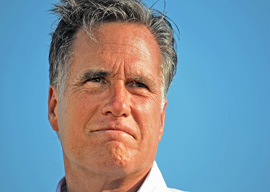
September 06, 2012

Although it sounds trite and perhaps a bit juvenile, the crucial trait for any president is empathy.
We want fairness in a world that is inherently unequal. We seek understanding though our motives are largely inscrutable. We desire recognition of individuality through enfranchisement even as we collectively vote in a dual-party democracy. These competing impulses demand that the only viable leader is one who can on some level identify with us.
Empathy ultimately tends toward justice. It is the mental operation of putting yourself in another’s stead. If a people’s representative can do that, he can be relied upon to act judiciously. Whether a man agrees with me or not is at its end immaterial. The essential aspect is whether he can at least envision things from my point of view.
Many of us have been neither farmers nor foresters yet can understand the heartbreak of watching a crop wither or a tree line burn. Most are neither bums nor billionaires but can imagine what it would be like to suffer hunger or have most of our income taxed away for purposes we would not support. Most readers could visualize themselves in the throes of a life contrary to their own.
At minimum if you are able to envision yourself as another person, you are less likely to consider yourself superior, but simply different.
This is the crux of the problem for Mitt Romney, who exudes a diffident attitude which gives pause to even his most ardent supporters. It has nothing to do with the bizarre lexicon he employs at rallies. Rather, the matter is bound up in how his campaign has been run.
One example was his behavior during the Republican debates. He frequently laughed at others or mocked their positions rather than counter them. More than once he rolled his eyes as Ron Paul was speaking. This seemingly inconsequential quirk is important. Romney was in no prep-school debate. Such antics were beneath an adult.
Instead Romney repeatedly ingrained the notion he was a bully by intimating that his colleagues were fools or that an elder statesman was senile. He seems not to have considered his stunts were rude, juvenile, and insulting. Mitt appears inherently unable to put himself in the place of opponents not as politicians, but as people.
Paul refused to speak at the Republican Convention, but his delegates were treated inexcusably. Lawfully elected representatives went unseated, unheard, and unrecognized.
“I felt like I was picked on,” said one of Paul’s supporters. In times of drastically reduced Republican opportunities for winning the White House, is it logical to humiliate a substantial portion of the base during the premier party event? Obviously, Mitt again did not stop to consider the obvious.
It was not only libertarians who were dismissed. Sarah Palin was persona non grata. Michele Bachmann and Herman Cain had diminished roles. Regardless of whether one values their opinions, what does it say when the top of the ticket intentionally slights prominent Tea Party members?